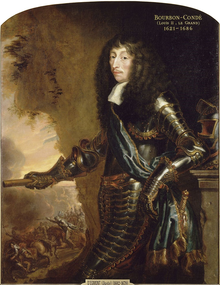Louis II de Bourbon, Prince of Condé
| Louis | |||||
|---|---|---|---|---|---|
| Prince of Condé "le Grand Condé" |
|||||

Louis by Justus van Egmont
|
|||||
| Born |
8 September 1621 Paris, France |
||||
| Died | 11 December 1686 (aged 65) Palace of Fontainebleau, France |
||||
| Burial | Église at Valléry, France | ||||
| Spouse | Claire-Clémence de Maillé-Brézé | ||||
| Issue Detail |
Henri Jules, Prince of Condé Louis, Duke of Bourbon Mademoiselle de Bourbon |
||||
|
|||||
| House | House of Bourbon / House of Condé | ||||
| Father | Henri, Prince of Condé | ||||
| Mother | Charlotte Marguerite de Montmorency | ||||
| Religion | Roman Catholicism | ||||
| Signature | |||||
| Full name | |
|---|---|
| Louis de Bourbon |
Louis de Bourbon, Prince of Condé (8 September 1621 – 11 December 1686) was a French general and the most famous representative of the Condé branch of the House of Bourbon. Prior to his father's death in 1646, he was styled the Duc d'Enghien. For his military prowess he was renowned as le Grand Condé.
Louis was born in Paris, the son of Henri de Bourbon, Prince de Condé and Charlotte Marguerite de Montmorency. His father was a first cousin-once-removed of Henry IV, the King of France, and his mother was an heiress of one of France's leading ducal families.
Condé's father saw to it that his son received a thorough education – Louis studied history, law, and mathematics during six years at the Jesuits' school at Bourges. After that he entered the Royal Academy at Paris. At seventeen, in the absence of his father, he governed Burgundy.
His father betrothed him to Claire-Clémence de Maillé-Brézé, niece of the powerful Cardinal Richelieu, chief minister of the king, before he joined the army in 1640. Despite being barely twenty years of age and in love with Mlle du Vigean (Marthe Poussard, called mademoiselle du Vigean, daughter of the king's gentleman of the bedchamber François Poussard, marquis de Fors and baron du Vigean, by his wife Anne de Neubourg, daughter of Roland, sieur de Sercelles), he was compelled by his father to marry his fiancée, a child of thirteen. Although she bore her husband three children, Enghien later claimed she committed adultery with different men in order to justify locking her away at Châteauroux, but the charge was widely disbelieved: Saint-Simon, while admitting that she was homely and dull, praised her virtue, piety and gentleness in the face of relentless abuse.
...
Wikipedia
